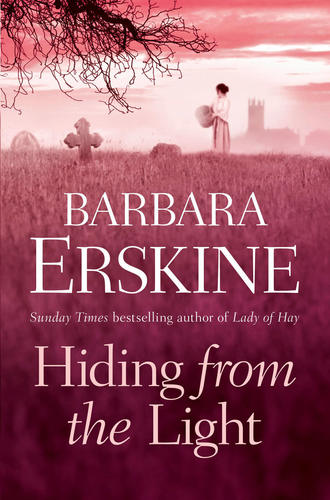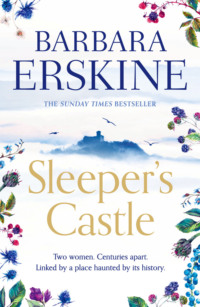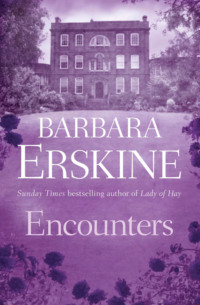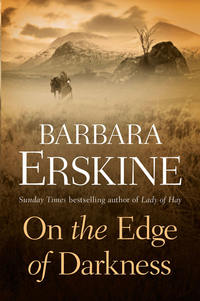
Полная версия
Hiding From the Light
She glanced down at her hands gripping the rail they had added on top of the wall when they moved into the flat. They were shaking. She could actually see them trembling as her fingers clung to the cold metal. With a frown she forced herself to let go and turned towards the French doors.
She stood for a long time under the shower, her face upturned to the sharp drumming of the water, letting it drive out the fear. Then she wrapped herself in a huge towel and went into the kitchen.
‘Emma?’ Piers found her there an hour later. He turned on the light. ‘Come to bed, sweetheart. We’ll discuss the cottage in the morning.’
‘There’s nothing to discuss.’ She rubbed her face wearily. ‘It’s done. The offer is made.’
‘And can be withdrawn. You haven’t signed anything.’
‘No, but –’
‘We’ll talk about it in the morning, Em. Come on.’ He reached for her hand and pulled her to her feet. ‘Maybe we can compromise. A cottage might be fun. One day. We could drive around a bit. Get some ideas.’
She sensed a softening of his attitude and glanced at him quickly. ‘Do you mean that? You’ll think about it?’
‘I’ll think about it.’ Turning off the light, he led her towards the bedroom.
Peggy and Dan were late for lunch. When they followed Emma out onto the roof, Piers was ensconced on the swing seat with a pile of newspapers, the wine already opened, and a half-empty glass beside him on the table.
‘Sorry, darling, we couldn’t find anywhere to park.’ Peggy kissed Emma on the cheek and threw herself down on one of the cushioned chairs. Dan picked up the bottle, checked the ice-cold, clouded glass to see how much was left and began to pour. He was a stout, fresh-faced man with white short-cropped hair and vivid blue eyes. Having retired at fifty from the City, he had spent the last ten years in a new career as a wine importer, specialising in small, select vineyards known only to a very exclusive group of connoisseurs.
‘Not bad stuff.’ He topped up Piers’s glass after he had done the others. ‘Good year.’
‘I thought so.’ Piers folded his paper and put it aside. ‘So, how are you both?’
‘Good.’ Peggy grinned. ‘But our news is very boring. I want to hear yours. Did you go and visit the cottage yesterday?’ She looked from one to the other expectantly.
Piers scowled. ‘So, Em told you about it, did she?’
‘Emma rang to say you might go and see it.’ Peggy frowned. ‘I know she said you wouldn’t consider it, Piers, but –’
‘She said that too, did she?’ Piers stood up. He went to lean on the parapet. ‘Perhaps you would like to remind her of the fact, Peggy.’
‘Piers!’ Emma had followed them out onto the terrace with a bowl of olives in her hand. She shook her head. ‘Ma doesn’t want to be dragged into this. Nor does Dan.’
‘Dragged into what exactly?’ Dan sat down on the chair next to Peggy’s. He leaned forward expectantly, his elbows on his knees. ‘Come on. Tell me. What’s this all about?’
‘I went to see a cottage on my own as Piers wouldn’t come,’ Emma said, passing him an olive. ‘And I liked it a lot.’
There was a short silence.
‘So, you are going to see it too?’ Dan asked cautiously. He was looking at Piers.
‘No.’ Piers drained his glass. ‘And in spite of that fact, in spite of me saying I don’t want a cottage at the moment because we’re too busy and we can’t, actually, afford it, in spite of all that,’ he paused for dramatic effect, ‘she put in an offer.’
There was a profound pause, then Emma turned to him. ‘You may not be able to afford a cottage,’ she said quietly, ‘but as I told you last night, I can.’ There was a further moment’s awkward silence.
‘I’ve got the particulars here.’ She stood up and disappeared inside for a moment. When she returned she had a sheaf of estate agent’s details in her hand. ‘It probably doesn’t look that special on paper, but it is.’
‘Why don’t we all run down there and see it?’ Dan drained his glass and held it out to Piers for more as Peggy took the A4 sheets from her daughter and began to read them. ‘What about next weekend? It sounds like a fun excursion to me.’
‘For you, perhaps.’ Filling the glass, Piers put the bottle down and turned to lean over the railing, staring out across the rooftops. ‘If Emma wants this place, that’s up to her. I don’t and I see no point in wasting a day of my life trailing off to see it. If we bought a cottage I would want it to be in Normandy or Brittany. Not, I repeat not, in Essex.’
Emma shrugged. ‘So much for mutual discussion.’
He swung round. ‘Excuse me? What discussion did you engage in before you made an offer for this place, pray? You went knowing my views. And you decided to buy it knowing my views.’ His voice rose slightly.
Dan and Peggy glanced at each other. Peggy leaned forward and touching Emma’s arm she frowned and shook her head. ‘Let’s change the subject,’ she said softly. ‘I think you two need to talk about this on your own later. Come on, I’ll give you a hand in the kitchen.’ She led the way in through the doors.
Emma followed slowly. She had picked up the estate agent’s details from the chair upon which her mother had left them. ‘I have to have it,’ she said as they went through into the kitchen. ‘I don’t know why.’
Peggy turned. ‘You don’t know why?’ She scanned her daughter’s face.
Emma shook her head. ‘I made the offer because I was in a complete panic in case I lost it. It’s pretty, but not especially so. I’ve seen prettier. It’s not in particularly good condition. The garden is too big for a holiday cottage and Piers hates the idea. I should tear this up –’ she waved the papers in front of Peggy’s face – ‘and forget all about it. Even the estate agent thought I was mad.’
‘But?’ Peggy’s eyes were fixed on her face.
‘But! I couldn’t be rational about it. From the first moment I saw the ad in Country Life, I knew I was going to live there.’ She opened the fridge door and brought out a plate covered in foil. ‘Mummy, this is weird. I know it more than anyone.’
Peggy frowned thoughtfully. ‘You’re prepared to risk your relationship with Piers over this house?’
Her daughter nodded. She was near to tears.
‘Take a day off next week. I’ll come with you. Dan too, if you’ll let him. And we’ll go and see it again.’
‘Tomorrow?’ Emma looked up thoughtfully. ‘I’ll call in sick. I am sick!’ She looked round wildly, found a roll of kitchen paper sitting on the draining board, and tearing off a sheet she blew her nose. ‘Can you get someone to look after the shop?’
Peggy nodded. ‘I’ll ring Edward. He’s always willing to do a day there for me.’ Edward was her next-door neighbour, a retired colonel whose heart had been soundly broken when Dan had arrived on the scene.
‘Don’t tell Piers,’ Emma pleaded suddenly.
‘No. I won’t.’ Peggy sighed. ‘But I think you should, Emma. What you and Piers have here is too good to lose, sweetheart. It really is.’
11
Sunday morning
Mike had walked over to the church early. After the early fog it was a glorious day and he could smell new-mown grass from the churchyard where Bill Standing, in his job as groundsman, had been trimming round some of the old graves. A retired professional gardener, Bill liked nothing more than to mow the grass and trim the hedges, training the cascades of rambling roses which grew over the lych gate and across the wall into a glorious patchwork of pink and red. He denied, however, having had anything to do with the mowing in the rectory garden, and had, to Mike’s certain knowledge, never set foot inside the church itself. To Mike, this last information had been an amazing piece of news. He didn’t understand it at all, especially as the old man seemed so fond of the place. Mike stopped at the gate and raised his hand in greeting. One day he would love to talk at length to the old boy, who, he suspected, was a fount of local knowledge and wisdom, and ask him why he wouldn’t go into the church, but so far his attempts to engage Bill in conversation had met with little success.
Bill had been staring down towards the estuary, a worried frown on his face. Mike followed his gaze. There was nothing to see but the bright strip of water and a few wheeling gulls. As Mike watched he shook his head thoughtfully and turned away. The expression on his face was grim. Mike paused and called his name. Bill glanced up, nodded, and turning the mower trundled it off in the opposite direction. Mike shrugged and paused to glance round the churchyard instead. The weathered headstones were mostly illegible now. The salt-laden east winds off the estuary had long ago beaten the inscriptions into indecipherable lichen-crusted anonymity, but there was a quiet warmth in the shelter of an August morning which made it seem a good place to lie in peace.
He opened the gate and walked up the path. The church was already unlocked, one of the churchwardens there before him, making ready for the service. Donald James, who had retired three years before from his position as manager of one of the oldest banks in Colchester, was carrying prayer books through from the vestry and laying them out on the shelf by the door. ‘Morning, Rector.’ Donald smiled at him. ‘Shall we leave the door open and let the sunshine in?’
Mike obligingly pushed the door back as far as it would go. The limed oak with its medieval ironwork groaned slightly as the sunlight hit the grey stone floor.
‘That’ll be enough books, Donald. I doubt if we’ll get very many.’ Mike shrugged. ‘Pity. But it is the holidays. Several of our regulars are away.’ He walked on up the aisle towards the vestry. The small room smelled of books and the old musty hassocks someone had stacked in a corner, rather than throw them away. Mike hesitated in the doorway, then he turned back and walked on towards the chancel. Kneeling on the top step before the altar he gazed up at the cross, composing himself, drawing his thoughts together and, finally, beginning to pray.
Behind him Donald moved quietly between the pews to pick up some fallen rose petals from the carpet beneath the pulpit. He glanced round as a shadow darkened the doorway for a moment and recognising the figure raised a hand in greeting. Judith Sadler was Mike’s lay reader. A tall, dark-haired woman in her early forties, she was wearing a severely cut navy trouser suit and a pale-blue shirt with what looked suspiciously like a dog collar. Donald frowned as she headed up the aisle. It would probably not occur to her to leave the rector alone until he had finished praying. Sure enough, she was already speaking when she was several yards from him.
‘Good morning, Mike. What a glorious day!’ Her voice cut Mike’s prayers off in mid-flow. He opened his eyes and sent up a quick last petition. For patience. His predecessor seemed to have thought a great deal of Judith and had recommended her as lay reader very highly. He had not disclosed until later that he had not endorsed Judith’s powerful ambition to become a priest herself and that his lack of recommendation had contributed to the Director of Ordinands turning her down for selection, something which Judith was not going to forget or forgive.
Mike rose to his feet and turned with a smile. ‘Good morning, Judith.’ Ushering her ahead of him towards the vestry so that they could robe in good time he saw out of the corner of his eye that a stranger had entered the church. That was a good sign. He was closely followed by two or three other figures momentarily silhouetted against the bright sunlight. Perhaps he had underestimated the size of the congregation after all.
Several times during the service Mike found himself looking at the unknown man who had seated himself three-quarters of the way down the aisle on the left. He was alone. A youngish man, perhaps in his mid-thirties, he had short cropped hair and a long, lugubrious face. Although he listened intently to Mike’s sermon and stood or sat in the right places Mike noticed he took no active part in the service. He did not pray out loud, he did not appear to be singing the hymns and he did not come up to take communion.
Perhaps he was a tourist, curious about the church? He did not have the appearance of an unhappy or troubled soul, but one couldn’t always tell. It was not entirely surprising when at the end of the service he saw the man hanging back, obviously hoping for a private word. After Mike had shaken hands with his last parishioners and seen them stroll out into the sunlight, he turned towards the man and they walked slowly together along the side aisle, out of earshot of Donald and Judith.
‘Mark Edmunds.’ The stranger held out his hand. ‘I’ve been staying up here for a few days. You may have noticed us. We’ve been filming in one of the shops at the end of the road here.’
Mike shrugged. ‘Sorry, I must have missed you. What are you filming?’
‘A documentary. About ghosts.’
‘Ah.’ Mike scanned the other man’s face. ‘And you want a quote from the church?’
‘I wouldn’t turn one down if it was offered.’ Mark gave a fleeting smile. ‘But that’s not actually why I’m here.’ They had drifted to a standstill beside a memorial to men of the parish who had died in the First World War. ‘Presumably you believe in ghosts? That is part of your job, isn’t it?’ Mark slid his hands into his pockets.
Mike nodded thoughtfully. ‘Yes,’ he said cautiously. ‘I do believe in them. But I have to admit I have never seen one. And I have never been consulted professionally about one. Do you have a problem?’
Mark shrugged. ‘It’s daft. We’re making a film, as I said, about the old Barker shop. I think the old boy who is trying to sell it is massaging the truth quite a bit, to be honest. But there are masses of stories about things that have happened there. We’ve filmed some interviews, misty evening scenes, shadows, atmosphere, several hours last night, you know the sort of thing.’ He paused, staring up at the neatly cut lettering on the wall plaque, name after name of young men slaughtered for their country.
‘And?’ Mike put in quietly. ‘Something has happened you didn’t foresee?’
Mark gave a wry grin. ‘Exactly.’
He had left the others in the pub shortly after nine, the night before, pleading a headache, and walked slowly back up the hill towards the bed and breakfast, relieved to be away from the noise and smoke of the public bar where they had found a small round table on which to balance their plates of steak and chips. The two late afternoon interviews had gone well. One had been with a woman who had been employed as a cleaner in the shop some twenty years ago. Her story had been recalled in a voice of calm certainty which had reassured and convinced them all. And her facts had more or less backed up Stan’s more lurid tale. She had heard the footsteps on several occasions. She had thought she had seen a figure lurking on the staircase and she had felt uncomfortable going into the shop early in the mornings, especially in the winter when she had had to unlock the door and turn on all the lights, conscious that she was the only person there. The flat had not been used, it appeared, since the flight of the cake-making lady in the fifties. In the end the cleaning lady had given in her notice and had not been back since. They had interviewed her against the backdrop of the river. The second interviewee had not minded doing his bit in the shop itself, but like Stan he declined to go upstairs. He had gone in as an electrician about five years before and had been forced to work most of the day in the upper room, putting in some new wiring. At one point he had turned round and found himself face to face with the man with the goatee beard. The apparition had only lasted seconds but it had been enough. Another electrician had had to be found to complete the job. The language with which he had described his feelings had been fruity to say the least. It had reduced Alice to helpless delighted giggles and made Joe wince. They would have to bleep much of the interview. And now they had left two cameras rolling on long play in the upstairs room.
Mark had strolled on up the hill, feeling better in the fresh air; appreciating the cool soft breeze scented with salt and tar and mud which was blowing up off the river. He let himself into the house, a huge rambling Edwardian pile with masses of rooms for guests and, as they had discovered, the most wonderful full English breakfasts, and climbed the stairs to his room. A shower, an early night and hopefully tomorrow they would find something interesting on the silently rolling film.
He fell asleep almost at once, one arm crooked under the pillow, the other across his face and within minutes he was dreaming. He was running along a narrow road in the dark, the mud squelching under his feet, and he could hear the sound of a horse galloping behind him. He ran faster, gasping for breath, sweat pouring off him. The hedges on either side of the lane were high and he couldn’t see where he was going. He blundered into a puddle and then another, desperately trying to keep his feet, aware that the horse was gaining on him fast. Dear God, it was going to catch him. He was searching frantically for a break in the hedge where he could get off the road and hide but the hedges were thorn – the branches were reaching towards him, tearing his clothes, interlaced into an impenetrable wall. He heard a shout behind him. Then another. The crowd were following the horse. He could hear them whistling, baying for his blood, his and that of the woman he was trying to save. He tried to force himself to run faster, but his strength was failing fast. Somehow he had to hide her. Somewhere. There must be somewhere. He could see her beside him now. She was running with him, her hair slipping out of her hood, her long skirts tangling between her legs. She had lost a shoe and she was crying. Then he heard her scream. And it was the same scream he had heard in the shop. In his nightmare suddenly he was there, standing in the middle of the upstairs room, and he was listening to a woman’s terrified, agonised scream …
Mark had awoken drenched in sweat and panting, and switching on the lamp reached for the wristwatch he had left on the bedside table. It was still barely ten o’clock.
It was a long time before he fell asleep again. This morning when he woke he had found that his first thought had been to find the local clergyman.
Mark took a deep breath and turned back to Mike.
‘You know practically every old house round here claims to be haunted either by a witch or by the Witchfinder General?’
Mike raised an eyebrow. ‘A slight exaggeration. But I know there are a few such claims. A piece of history like that leaves its mark on a community.’
‘And it’s good for the tourist trade.’
‘Indeed.’ Mike glanced at him sideways. ‘May I ask what it is that has happened to make you seek me out?’
‘Nightmares.’ Mark shrugged.
‘And you think this would be the domain of the church rather than the doctor?’
Mark ran his hand through his hair. ‘I’m not neurotic. I normally sleep like the dead.’ He paused and exhaled sharply, eyes closed. ‘Not a happy choice of phrase, perhaps. I sleep well. I’m in good health. The only dead which normally give me nightmares are deadlines.’ He gave a humourless chuckle. ‘It has only happened since we came here. Last night –’ he shook his head – ‘and the night before, I was running, hiding, trying to hide someone, then, in the dream,’ he paused, finding it hard to speak, ‘I was upstairs. In the shop. And I heard a scream. I can’t get the sound of those screams out of my head.’
Mike felt a small cold shiver tiptoe down his spine. ‘Does this fit in with the history of the shop?’ he asked gently.
‘Maybe. We’ve been told Hopkins walked some of the witches there.’
‘Walked them?’
‘Up and down, all night. He practised sleep deprivation. A very effective form of torture. Proper torture was illegal in England, you understand, except where treason was suspected. This was his speciality. No mess. No equipment needed.’ He shivered. ‘But they wouldn’t have screamed. Would they? Not just for walking?’
Mike did not reply immediately. Staring at the ground he absorbed unseeing the gentle colours of the small, stained-glass window thrown onto the grey stone at their feet. ‘Would you like to come back to the rectory to discuss this? It’s a serious matter and I would really like to take some time to think. And to pray.’ He looked up and grinned almost apologetically.
Mark shook his head. ‘I can’t now.’ He glanced at his watch. ‘We’re filming an interview at one o’clock. I’d better get on. Perhaps some other time?’
Mike nodded. ‘Whenever you like. You know where to find me.’ He paused. ‘Mr Edmunds, before you go, you said you filmed through the night. Was there anything on the film?’
Mark smiled wryly. ‘No,’ he said. ‘Not a thing!’
Mike watched as he made his way to the door and disappeared out into the sunshine.
‘So, what was that about?’ He hadn’t noticed Judith approach. Still wearing her blue scarf and surplice, she was standing only a few feet away, half hidden by one of the pillars.
Mike frowned, suppressing a sudden flash of irritation at the interruption, yet again, of his thoughts. ‘Just a short chat. Nothing to worry about.’
He glanced down the church towards the door. ‘Donald gone?’
Judith nodded. ‘He had to get back. Family duties. Mike, if you’re not doing anything would you like to come back to lunch with me? Just pot luck. Salad. Glass of something?’ She smiled uncertainly, obviously expecting him to decline, and he felt a sudden wave of pity. He knew Judith was lonely. ‘That would be nice. Thanks. I’d love to.’
She lived in a three-bedroomed bungalow in a road of identical houses set in small rectangular plots on the top of the hill behind the town. As Mike climbed out of her car, he looked round at her garden. He had been here many times and knew her life-story intimately. She had lived in this house all her life. Her mother had died when she was at teacher training college and Judith had stayed on to look after her father. His joy had been his garden. From what Mike had heard from others who had known the old man when he was still strong enough to go out and garden, it had been a riot of colour and exuberance in sharp contrast to the grim fifties decor which still adorned the bungalow on the inside. There was little sign of that garden now. Mike could never quite decide whether after the old man’s death in 1996 Judith had deliberately rooted out every sign of beauty and grace, or whether it was merely that she was uninterested in gardening and had not noticed the dying roses and the blighted leaves. As each plant died it was cut down and burned and the gap in the soil was rapidly covered by a thatch of chickweed and goose grass.
Mike followed her inside, resigning himself to the statutory small glass of sweet sherry which, he suspected, she bought just for him. She did not drink herself, but would sit and watch him sip from the thimble-shaped glass with an intensity which always made him very uncomfortable.
The table was laid for two. He found himself picturing her returning to the empty house, had he turned down her invitation, and sadly removing one place setting, and he knew that was why he had said yes, as he had said yes every month or so since he had arrived in the parish.
‘Judith, you’ve lived in this place all your life.’ He followed her through to the kitchen, a habit which irritated her intensely. She would have preferred him to stay neatly in the lounge until she had the meal on the table in the small dining room. ‘Have you come across much interest in the history of the witchfinder?’ He leaned on the counter. A couple of bottles of pills stood there, side by side, and he frowned. He hoped she wasn’t ill. Tactfully he transferred his gaze to the window and stared out at the back lawn. There were no flowerbeds at all now between the grass and the wooden panel fence. The only remotely decorative item left was a single white plastic-covered washing line.
Judith had turned on the electric element under the pan of potatoes which had been waiting ready-peeled on the stove. ‘Matthew Hopkins?’ She opened the fridge and brought out some packets of cold meat. ‘I think most people know who he was.’ Reaching into the drawer for a pair of scissors she sliced the top off each packet in turn and arranged the slices of ham, salami and chicken on a serving dish. ‘Why?’ She glanced at him sharply.








